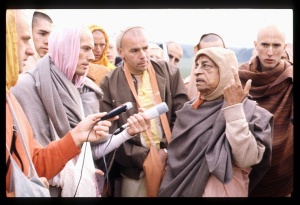CC Madhya 24.249 (1975)

A.C. Bhaktivedanta Swami Prabhupada
TEXT 249
- nārada kahe,--"ardha mārile jīva pāya vyathā
- jīve duḥkha ditecha, tomāra ha-ibe aiche avasthā
SYNONYMS
nārada kahe—Nārada Muni replied; ardha mārile—by half-killing the animals; jīva pāya vyathā—the living beings suffer too much pain; jīve duḥkha ditecha—you are giving troubles to the living beings; tomāra—your; ha-ibe—there will be; aiche avasthā—the same suffering in retaliation.
TRANSLATION
"Nārada Muni replied, 'If you leave the animals half-dead, you are purposefully giving them pain. Therefore you will have to suffer in retaliation.'
PURPORT
This is an authoritative statement given by the greatest authority, Nārada Muni. If one gives another living entity unnecessary pain, one will certainly be punished by the laws of nature by a similar pain. Although the hunter Mṛgāri was uncivilized, he still had to suffer the results of his sinful activities. However, if a civilized man kills animals regularly in a slaughterhouse to maintain his so-called civilization, using scientific methods and machines to kill animals, one cannot even estimate the suffering awaiting him. So-called civilized people consider themselves very advanced in education, but they do not know about the stringent laws of nature. According to nature's law, it is a life for a life. We can hardly imagine the sufferings of one who maintains a slaughterhouse. He endures suffering not only in this life, but in his next life also. It is said that a hunter, murderer or killer is advised not to live and not to die. If he lives, he accumulates even more sins, which bring about more suffering in a future life. He is advised not to die because his dying means that he immediately begins to endure more suffering. Therefore he is advised not to live and not to die.
As followers of the Vedic principles, we accept the statements of Nārada Muni in this regard. It is our duty to see that no one suffers due to sinful activities. Foolish rascals are described in Bhagavad-gītā as māyayāpahṛta-jñānāḥ, which indicates that although they are superficially educated, māyā has taken their real knowledge away. Such people are presently leading human society. In Śrīmad-Bhāgavatam they are also described as andhā yathāndhair upanīyamānāḥ. These rascals are themselves blind, and yet they are leading others who are blind. When people follow such leaders, they suffer unlimited pains in the future. Despite so-called advancement, all this is happening. Who is safe? Who is happy? Who is without anxiety?